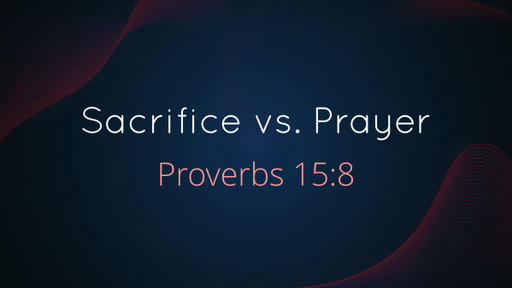Sacrifice vs. Prayer

Sermon • Submitted • Presented • 25:15
0 ratings
· 10 viewsFiles
Notes
Transcript
Introduction
Introduction
Turn to Proverbs 15:8.
Perhaps you’ve heard the cliché, “beauty is in the eyes of the beholder.” It means that beauty is subjective and based on one’s personal experience and opinion.
For example, one person might look with admiration at an old American muscle car while another might look at the same vehicle and merely see it as a hunk of metal.
Obviously, human opinions may differ, but the one opinion that matters is God’s. A.W Tozer once made a statement very similar to the cliche that I just mentioned. He said,
Beauty is in the eye of the Creator.
A. W. Tozer
We can be certain of this: What God calls beautiful, is beautiful. What God calls abominable, is abominable.
Today we’re going to read one proverb where Solomon makes this principle very clear.
Read Proverbs 15:8.
Message
Message
In recent weeks, I’ve been reading through Proverbs in my personal time with the Lord and I’ve noticed a pattern. Chapters 1-9 offer a clear flow of thought from one chapter to the next. Chapters 10-15 are more of a compilation of Solomon’s proverbs on a variety of themes and subjects. These subjects are usually offered as a comparison or in contrast such as we see in this verse.
Read Proverbs 15:8 again.
There are several things that are contrasted here:
Sacrifices vs prayer
The wicked vs the upright
What God views as abomination vs what God views as His delight
Put it all together as Solomon does and you’ll see that he outlines one thing that is abominable to God and another thing that is beautiful to God.
Truly, “beauty is in the eye of the Creator.”
So let’s consider what God thinks is beautiful in this verse.
Let’s consider first, the sacrifices of the wicked.
From a human perspective, the animal sacrifices to God could be expensive. Surely God would value such sacrifice!? When the rich sacrificed, they were accompanied with much pomp and fanfare.
Hear the word of the Lord, ye rulers of Sodom; Give ear unto the law of our God, ye people of Gomorrah. To what purpose is the multitude of your sacrifices unto me? saith the Lord: I am full of the burnt offerings of rams, and the fat of fed beasts; And I delight not in the blood of bullocks, or of lambs, or of he goats. When ye come to appear before me, Who hath required this at your hand, to tread my courts? Bring no more vain oblations; incense is an abomination unto me; The new moons and sabbaths, the calling of assemblies, I cannot away with; It is iniquity, even the solemn meeting. Your new moons and your appointed feasts my soul hateth: They are a trouble unto me; I am weary to bear them. And when ye spread forth your hands, I will hide mine eyes from you: Yea, when ye make many prayers, I will not hear: Your hands are full of blood.
God called the sacrifices of the wicked an abomination. It was something that He loathed. It was something that He detested. He couldn’t stand it!
But in contrast, Solomon writes, “the prayer of the upright is his delight.”
From a human perspective, a sacrifice would surely be much more valuable to God than a prayer, which costs nothing. But I remind you: “beauty is in the eye of the Creator.”
Sometimes you may wonder if desiring and living a righteous life is worth it.
Is it worth the daily resistance to temptation?
Is it worth the daily denial of the flesh?
Is it worth the daily confession of sin and striving to walk with Jesus?
Is living an upright life worth the daily battle?
Solomon tells us in this proverb that indeed, it is. Because while the wicked may offer lavish, expensive sacrifices to God, God turns his nose up and abhors it. In contrast, the simple prayer of a righteous man or woman is His delight.
Application: The righteous life is worth it. Don’t give in to temptation. Don’t give up on walking with God and daily pleasing Him.